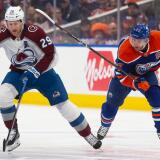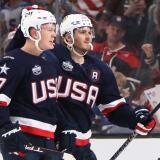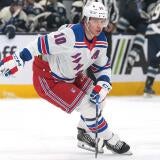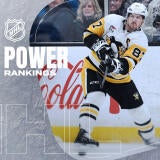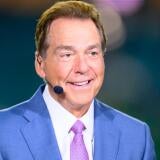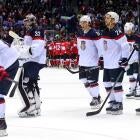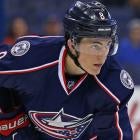Goalie save percentage against scoring chances: Round 1
We're keeping track of how well goalies perform against scoring chance opportunities in the playoffs. Here are the best goalies through the first round.
By
Adam Gretz
•
3 min read
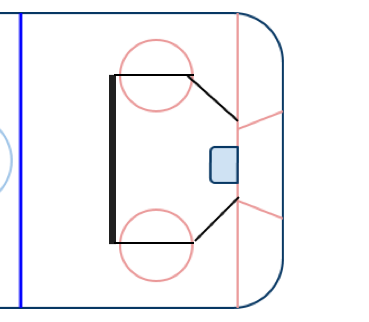 During the playoffs I've been trying to keep track of how well goalies have performed against scoring chance opportunities.
During the playoffs I've been trying to keep track of how well goalies have performed against scoring chance opportunities.Scoring chances can be pretty subjective and change from person to person, but for the purposes of this project I'm counting any shot that comes from within the box on the illustration shown to the right.
It's a pretty common definition, and all goalies are being judged the same way.
Now that we have that out of the way, let's dive right in. And let's start with the Phoenix Coyotes, a team that benefited from one of the best goalie performances in the first round.
The Coyotes did not advance to the second round of the playoffs because of their team defense. They did not advance because they created more offense than the Chicago Blackhawks, or because they blocked more shots, or because they were a better overall team. In the end, they advanced for one very simple reason: Their goalie, Mike Smith, was significantly better than Chicago's goalie. Frankly, it wasn't even close and this should have been obvious to anybody that watched even one game of that series.
Phoenix needed Smith to steal it, and he did.
Nearly every game was played in the Phoenix end of the ice as Chicago pumped scoring chance after scoring chance at Smith, while he stopped pretty much everything that was thrown in his direction. At the other end of the ice, Corey Crawford had some noticeable struggles for the Blackhawks, allowing some bad goals at the absolute worst moments (like a couple of overtime goals to Mikkel Boedker).
Smith proved to be a godsend for the Coyotes this season as the replacement for Ilya Bryzgalov. He was not only a suitable replacement in the crease, he actually upgraded the position and played better than Bryzgalov ever did in Phoenix. I don't know if you give more credit to general manager Don Maloney for being willing to take a chance on Smith and give him a starting job after nobody else wanted him (keep in mind, Smith was available on waivers last year and went unclaimed), or Coyotes goalie coach Sean Burke. Either way, something clicked for Smith in Phoenix and he took advantage of his opportunity.
He has been one of the best goalies in the NHL this season, and that's carried over right into the postseason.
Here is the complete list of goalies that appeared in a game during the first round. They are ranked by their save percentage on scoring chance opportunities.
| Goalie Save Percentages Against Scoring Chances: Through round 1 | ||||||||
| Goalie (team) | Scoring Chance Saves | Scoring Chances Against | Scoring Chance Save Percentage | |||||
| Jonathan Quick (Los Angles) | 53 | 57 | .930 | |||||
| Mike Smith (Phoenix) | 92 | 100 | .920 | |||||
| Cory Schneider(Vancouver) | 39 | 43 | .907 | |||||
| Brian Elliott (St. Louis) | 41 | 46 | .891 | |||||
| Henrik Lundqvist (New York) | 81 | 91 | .890 | |||||
| Jaroslav Halak (St. Louis) | 20 | 23 | .870 | |||||
| Pekka Rinne (Nashville) | 53 | 61 | .869 | |||||
| Braden Holtby (Washington) | 71 | 82 | .866 | |||||
| Craig Anderson (Ottawa) | 89 | 103 | .864 | |||||
| Johan Hedberg (New Jersey) | 6 | 7 | .857 | |||||
| Jose Theodore (Florida) | 52 | 62 | .839 | |||||
| Martin Brodeur (New Jersey) | 60 | 72 | .833 | |||||
| Antti Niemi (San Jose) | 57 | 69 | .826 | |||||
| Tim Thomas (Boston) | 50 | 61 | .820 | |||||
| Scott Clemmensen (Florida) | 36 | 44 | .818 | |||||
| Jimmy Howard (Detroit) | 39 | 48 | .813 | |||||
| Corey Crawford (Chicago) | 57 | 71 | .803 | |||||
| Ilya Bryzgalov (Philadelphia) | 60 | 76 | .789 | |||||
| Roberto Luongo (Vancouver) | 24 | 31 | .774 | |||||
| Marc-Andre Fleury (Pittsburgh) | 63 | 85 | .741 | |||||
| Brent Johnson (Pittsburgh) | 3 | 5 | .600 | |||||
| Sergei Bobrovsky (Philadelphia) | 7 | 12 | .583 | |||||
It's probably not a coincidence that most of the goalies at the top of the list are moving on. The one exception: Vancouver's Cory Schneider, who just happened to be going up against the No. 1 goalie on the list. Tough break.
Also, is it any surprise the Pittsburgh-Philadelphia series turned out to be the highest scoring series in the first round, and one of the highest scoring of all time? Not only were both defenses a disaster, the goaltending wasn't any better. You can make excuses for them and say they had to face a lot of quality chances, but so did guys like Smith, Henrik Lundqvist and Pekka Rinne. The Flyers can score with any team in the league, but they're going to need Bryzgalov (or Bobrovsky) to tighten things up if they want to keep advancing because they may not get the luxury of playing another team that completely abandons defense and goaltending.
I will continue to update this throughout the playoffs.
For more hockey news, rumors and analysis, follow @EyeOnHockey and @agretz on Twitter and like us on Facebook.


